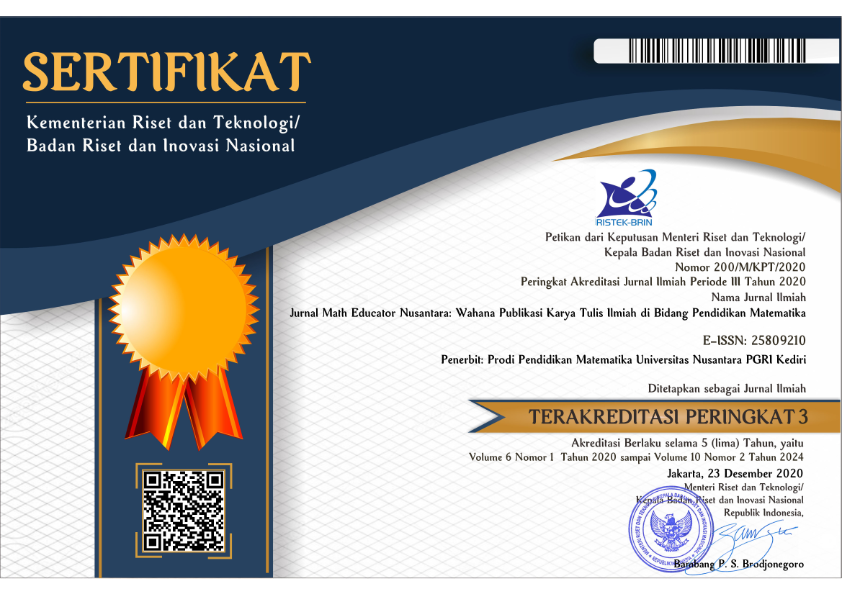Development of PISA model math problems using the context of lamban dalom traditional house
DOI:
https://doi.org/10.29407/jmen.v10i1.21693Keywords:
Research and Development, Development Study, PISA, Lampung contextAbstract
The PISA 2022 results show that Indonesian students' mathematical literacy scores have decreased again. One of the reasons is that students need more practice working on PISA model questions. This study aims to develop PISA model math problems using the context of Lamban Dalom traditional houses that are valid, practical, and have potential effects. This research used the Design Research method of development study type. The research stages include Preliminary and Formative Evaluation stages (expert review, one-to-one, small group, field test). The research results are a set of mathematical problems of the PISA model of space and shape content with the context of Lampung Lamban Dalom, which is valid in terms of content, construct, and language, practical, and has a potential effect of 5 items. It is applicable based on small group trials and potentially impacts the field test stage. In addition, students also become more challenged to solve similar problems even though the scores obtained still need to meet the criteria for completeness. Future researchers are advised to develop PISA model math problems with different content and contexts further by involving more potential users and conducting trials with more students.
References
Adha, I., & Refianti, R. (2019). Pengembangan Lembar Kerja Siswa (LKS) Menggunakan Pendekatan Matematika Realistik Indonesia Berbasis Konteks Sumatera Selatan. Jurnal Pendidikan Matematika (JUDIKA EDUCATION), 2(1), 1–10. https://doi.org/10.31539/judika.v2i1.729
Afandi, M., Ramadhona, R., & Antika, R. (2021). Pengembangan Soal Matematika Tipe PISA dengan Konteks Permainan Tradisional Kepulauan Riau. SOJ: Student Online Journal, Universitas Maritim Raja Ali Haji, 2(2), 1450–1464.
Ambarwati, B. T., & Ekawati, R. (2022). Analisis Literasi Matematika Siswa Dalam Menyelesaikan Soal Higher Order Thinking Skills (Hots) Proporsi. MATHEdunesa, 11(2), 390–403. https://doi.org/10.26740/mathedunesa.v11n2.p390-403
Charmila, N., Zulkardi, Z., & Darmawijoyo, D. (2016). Pengembangan soal matematika model PISA menggunakan Konteks Jambi. Jurnal Penelitian Dan Evaluasi Pendidikan, 20(2), 198–207. https://doi.org/10.21831/pep.v20i2.7444
Dasaprawira, M. N. (2021). Pengembangan Soal Matematika Tipe PISA Menggunakan Konteks Wisata Banyumas dan Cilacap. Prisma, 10(1), 88. https://doi.org/10.35194/jp.v10i1.1128
DEWANTARA, A. H. (2019). Soal Matematika Model Pisa: Alternatif Materi Program Pengayaan. DIDAKTIKA : Jurnal Kependidikan, 12(2), 197–213. https://doi.org/10.30863/didaktika.v12i2.186
Gustiningsih, T., & Somakim. (2021). Pengembangan Soal Matematika Tipe Pisa Level 5. AKSIOMA: Jurnal Program Studi Pendidikan Matematika, 10(2), 915–926.
Habibi, H., & Prahmana, R. C. I. (2022). Kemampuan Literasi Matematika, Soal Model PISA, dan Konteks Motif Batik Tulis Jahe Selawe. Jurnal VARIDIKA, 33(2), 116–128. https://doi.org/10.23917/varidika.v33i2.16722
Iraratu, M. K., Urath, S., Srue, O., Nifanngelyau, J., Sekolah, D., Keguruan, T., & Saumlaki, P. (2021). Jurnal Pendidikan Indonesia ( Japendi ) Pendidikan KAJIAN ETNOMATEMATIKA PADA RUMAH ADAT DESA LORULUN SEBAGAI SUMBER BELAJAR MATEMATIKA * Correspondence INFO ARTIKEL Diajukan Diterima 18 Desember 2021 Diterbitkan ABSTRAK Kata kunci : Margarita Kartini Ira. 2(12), 2119–2133.
Kurniawati, I., & Kurniasari, I. (2019). Literasi Matematika Siswa Dalam Menyelesaikan Soal Pisa Konten Space and Shape Ditinjau Dari Kecerdasan Majemuk. MATHEdunesa, 8(2), 441–448.
Novita, R., & Putra, M. (2016). Using task like Pisa’s problem to support student’s. Journal on Mathematics Education, 7(1), 31–42. http://doi.org/10.22342/jme.7.1.2815.31-42
Nuryenisa, N., Karim, K., & Rahmita, N. (2022). Pengembangan Soal Matematika Model Pisa Level 4 Berbasis Etnomatematika Budaya Banjar Untuk Mendukung Pembelajaran Matematika Smp. Jurmadikta, 2(2), 61–72. https://doi.org/10.20527/jurmadikta.v2i2.1376
OECD (2023), PISA 2022 Results (Volume I): The State of Learning and Equity in Education, PISA, OECD Publishing, Paris, https://doi.org/10.1787/53f23881-en
Prastyo, H. (2020). Pengembangan Soal Matematika Model PISA Menggunakan Konteks Kalimantan Timur. Jurnal Padegogik, 3(1), 1–44. https://doi.org/10.35974/jpd.v3i1.2230
Purnomo, S. (2016). Pengembangan Soal Matematika PISA Konten Space and Shape untuk mengetahui Level Kemampuan Tingkat Tinggi berdasarkan Analisis Model RASCH (Doctoral Dissertation).
Putra, Y. Y., Zulkardi, Z., & Hartono, Y. (2016). Pengembangan Soal Matematika Model PISA Level 4, 5, 6 Menggunakan Konteks Lampung. Kreano, Jurnal Matematika Kreatif-Inovatif, 7(1), 10–16. https://doi.org/10.15294/kreano.v7i1.4832
Putri, A. M. A. U., Ningtyas, Y. D. W. K., & Galatea, C. K. (2022). Pengembangan soal matematika model programme for international student assessment (PISA) konten quantity dalam konteks budaya Jember. Delta-Pi: Jurnal Matematika Dan Pendidikan Matematika, 11(2), 164. https://doi.org/10.33387/dpi.v11i2.4851
Putri, R. I. I., & Zulkardi. (2020). Designing piSA-like mathematics task using Asian games context. Journal on Mathematics Education, 11(1), 135–144. https://doi.org/10.22342/jme.11.1.9786.135-144
Rauf, A., Fitriasari, P., & Mulbasari, A. S. (2022). Pengembangan Soal Matematika Model PISA dengan Menggunakan Konteks Budaya Palembang. Jurnal Edukasi Matematika Dan Sains), 10(2), 265–276. https://doi.org/10.25273/jems.v10i2.11761
S Elly, A., & Rosalina, E. (2019). Soal Matematika Model PISA Menggunakan Konteks Lubuklinggau. Jurnal Pendidikan Matematika Raflesia, 04(02), 67–75.
Sabrina, S. N., Nursyahidah, F., & Albab, I. U. (2019). Pengembangan Soal Matematika PISA- Like Pada Konten Change and Relationship Menggunakan konteks Jawa Tengah. SEMINAR NASIONAL MATEMATIKA DAN PENDIDIKAN MATEMATIKA (4’th SENATIK), 318–328.
Tessmer, M. (2013). Planning and conducting formative evaluations. Routledge.
Tandiseru, S. R. (2014). Efektifitas Pendekatan Kontekstual Budaya Lokal Terhadap Pencapaian Kemampuan Representasi Matematis Siswa SMP. Jurnal Keguruan Dan Ilmu Pendidikan, 3(3), 675–683.
Widjaja, W. (2013). The use of contextual problems to support mathematical learning. Journal on Mathematics Education, 4(2), 151–159. https://doi.org/10.22342/jme.4.2.413.151-159
Downloads
Published
Issue
Section
License
Authors who publish with this journal agree to the following terms:
- Copyright on any article is retained by the author(s).
- The author grants the journal, the right of first publication with the work simultaneously licensed under a Creative Commons Attribution License that allows others to share the work with an acknowledgment of the work’s authorship and initial publication in this journal.
- Authors are able to enter into separate, additional contractual arrangements for the non-exclusive distribution of the journal’s published version of the work (e.g., post it to an institutional repository or publish it in a book), with an acknowledgment of its initial publication in this journal.
- Authors are permitted and encouraged to post their work online (e.g., in institutional repositories or on their website) prior to and during the submission process, as it can lead to productive exchanges, as well as earlier and greater citation of published work.
- The article and any associated published material is distributed under the Creative Commons Attribution-ShareAlike 4.0 International License















